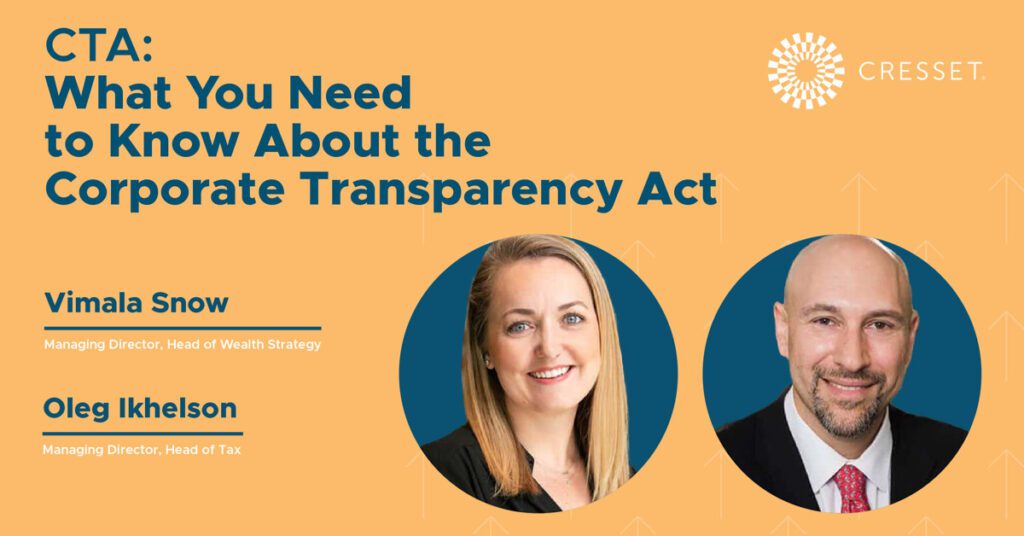
By Oleg Ikhelson, J.D., CPA, Managing Director, Head of Tax, and Vimala Snow, Managing Director, Head of Wealth Strategy
Months before it became federal law, there had already been a lot of talk about the Corporate Transparency Act (CTA) that went into effect on January 1, 2024. Pursuant to the CTA, domestic and foreign business entities who are registered with any Secretary of State may be required to report information about their beneficial owners with the U.S. Department of Treasury.
While there are multiple exceptions (i.e., larger companies, those governed by a separate statute, long inactive or governmental entities), the bulk of small businesses and LLCs fall under the broad umbrella of what the CTA calls a Reporting Company.
What should be reported? Each Reporting Company must report its legal name, its trade name (if applicable), the business address, jurisdiction information and U.S. taxpayer identification number (FEIN), and its so-called Beneficial Owners and Company Applicant.
Who is a Beneficial Owner? A Beneficial Owner is an individual who directly or indirectly 1) exercises substantial control over the Reporting Company (even if they do not own an ownership interest) and/or 2) owns or controls at least 25% of the ownership interests of the Reporting Company.
What is Substantial Control? An individual is deemed to exercise substantial control if they meet any of the following criteria: 1) they are a senior officer of the Reporting Company, 2) they have the authority to appoint and remove officers or a majority of directors of the Reporting Company, 3) they have decision making authority over important business, financial or structural decisions related to the Reporting Company, or 4) exercise any other form of substantial control not covered.
How do family trusts impact Beneficial Ownership? Note that the estate planning you may have in place may directly impact the individuals that would be considered Beneficial Owners. For example, trustees, beneficiaries, trust protectors, and other power holders may be considered to have indirect control or indirect ownership of the Reporting Company. Additionally, the determination whether an individual has ownership or control of over more than 25% requires aggregating all an individual’s interests, whether owned or controlled directly or indirectly. Family interests are not attributed to one another when calculating the 25%.
Who is a Company Applicant? There are two types of Company Applicants: 1) the “direct filer” is the person who signed the formation documents for the entity, and 2) any additional individual who “directs or controls the filing action.” If more than one individual was involved in the filing, you must report two Company Applicants.
What should be reported? For Beneficial Owners and the Company Applicant, the government now requires: 1) the Individual’s name; 2) Date of Birth; 3) Residential Address; and 4) Identifying number from an acceptable identification document such as a passport or U.S. Driver’s License (along with an accompanying image of the document). To minimize the filing requirements associated with changes to personal information (such as an address change), we recommend that individuals obtain a FinCEN ID ahead of filing and BOI reports so that updates only need to be made once, at the FinCEN ID level, rather than for each related entity.
What if reported information changes? The Reporting Company must file updated BOI reports within 30 days of any change about the company or its Beneficial Owners (including a new DBA, a change in Beneficial Owners, or to the Beneficial Owner’s name, address, etc. (this does not apply to Company Applicants).
When are the BOI reports due? Reporting Companies formed prior to 2024 have until January 1, 2025 to submit their Beneficial Ownership Information Report (“BOI”). Reporting Companies created or registered in 2024 must file within 90 calendar days of formation. Reporting Companies formed on or after January 1, 2025 will have 30 days to file their initial BOI Report.
How does my Reporting Company file a BOI Report? If you would like to handle filings directly, FinCEN’s secure electronic filing system that can be found at https://boiefiling.fincen.gov. For those who would like assistance managing filings, Cresset has negotiated special pricing with eMinutes, a law firm focused on corporate formation and administration. Please talk to your Cresset Advisor or reach out to Jesse Clark for help.
Who will have access to reported information? Due to the highly sensitive nature of the information, the information provided to FinCEN will be maintained on a secure, nonpublic database. It may only be disclosed to 1) federal agencies for national security, intelligence, or law enforcement purposes, 2) state, local, or tribal enforcement agencies if authorized by a court in connection with an investigation, 3) for limited requests from “trusted” foreign jurisdictions, or 4) upon a request by a financial institution if the Reporting Company consents.
Contact Cresset to collaborate with experienced professionals who can help protect your assets.
About Cresset
Cresset is an independent, award-winning multi-family office and private investment firm with more than $235 billion in assets under management and advisement (as of 10/31/2025). Cresset serves the unique needs of entrepreneurs, CEO founders, wealth creators, executives, and partners, as well as high-net-worth and multi-generational families. Our goal is to deliver a new paradigm for wealth management, giving you time to pursue what matters to you most.
https://cressetcapital.com/disclosures/
